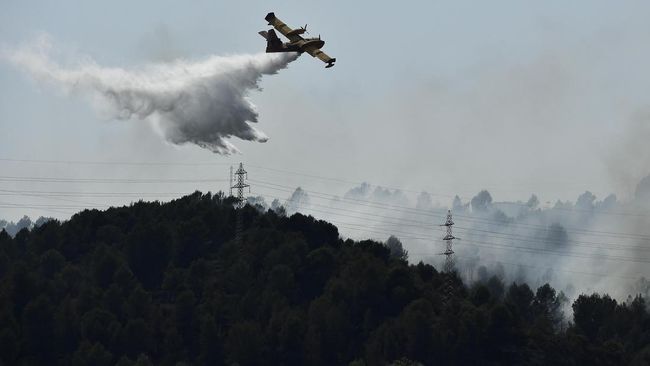Countries in Europe, North Africa, the Middle East and Asia have been affected by Heat wave Where Heat wave which increases the temperature by more than 40 degrees Celsius. However Indonesia did not experience the same, why is this?
The UK, for example, experiences extreme temperatures that exceed 40 degrees Celsius. The train was not running because the rail temperature had reached 62 degrees Celsius, causing damage.
Portugal has even reported 1,063 deaths since the heatwave hit on at least July 10.
Quotation Direct energy, A heat wave is a very dangerous weather condition in which the temperature rises well above the upper temperature limit in the region. This high heat combines with high humidity levels and creates heat bubbles in certain areas over a long period of time.
The heat wave itself is formed when high pressure air settles in the air at an altitude of 3,000 to 7,600 meters and causes the hot air to sink. The descent of hot air creates bubbles that act like seals and trap heat near the ground.
The seal then prevents convection currents that form clouds and rain clouds, both of which will serve to cool an area.
This phenomenon then produces heat waves that have high heat and high humidity near land. This heat wave can last from a few days to several weeks.
Heat waves are not limited to areas generally considered to have high temperatures. This phenomenon can occur anywhere when high pressure air can create an environment to form a hot dome.
However, the state of the Indonesian territory does not allow this heat wave phenomenon to occur.
“Heat temperature events in Indonesia are not classified as heat waves like in India because they do not meet the definition of extreme weather events by the World Meteorological Agency (WMO), which are anomalies that are 5 degrees warmer than the climatological mean maximum temperature at a location and have lasted at least 5 days,” said Plt. BMKG deputy climatologist Urip Haryoko in a BMKG statement some time ago.
The maximum temperature of around 36 degrees is also not the highest temperature ever recorded in Indonesia, as the highest temperature ever recorded was 40 degrees in Larantuka (NTT) on September 5, 2012.
According to the BMKG, the circulation of air masses has triggered the retention of hot air over parts of Sumatra and Java, thus amplifying or extending the time and duration of hot temperatures in May.
However, these conditions have not yet entered dangerous extreme conditions such as heat waves.
“However, the BMKG reassures once again that this condition is not an extreme dangerous condition such as a heat wave, although the public is still advised to avoid dehydration and to stay in good health” , said the BMKG.
The assets of the archipelago
Alberth Christian Nahas, coordinator of the BMKG’s Greenhouse Gas Information Subdivision, confirmed that heat waves occur when the air temperature at one location is above 35 degrees for 5 consecutive days. However, Indonesia is now still considered a mid-temperature cool alias.
“By the way in Indonesia, it’s not just in Jakarta, in general [gelombang panas] never happened. Why? We are surrounded by oceans,” he said in a joint interview with Air Talk on Tuesday (7/19).
“Indonesia has never [mengalami heatwave] from the BMKG archives. If the heat is extreme for a day or two or [hitungan] hours, never. Jakarta at 38-39 [derajat Celsius]. It’s a moment, it’s not in Heat wave,” he said.
What relationship with the ocean? “One of the components that can reduce Heat wave it’s water vapour, whereas with us it’s always humid. Potential for Heat wave very difficult to achieve, especially up to 5 days,” he added.
Alberth said this type of condition does not belong to European countries which are generally drier. “At certain seasons, [saat] summerthe sun is there, the temperature is higher, drier, the potential Heat wave bigger.”
This heat wave itself presents many dangers, ranging from health problems, dry land to forest and ground fires.
[Gambas:Video CNN] (lom/els/lth)

“Zombie geek. Beer trailblazer. Avid bacon advocate. Extreme introvert. Unapologetic food evangelist. Internet lover. Twitter nerd.”





